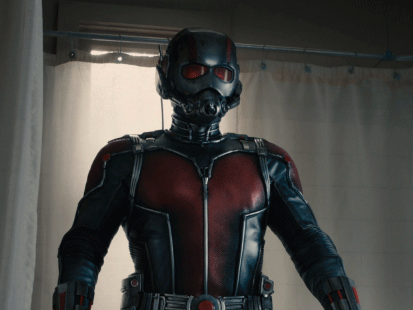

As manager of outreach at Caltech’s Institute for Quantum Information and Matter, physicist Spiros Michalakis is charged with not only researching quantum mechanics but also getting people excited about it. To do so he makes science-themed comics and videogames and consults on movies, including this summer’s Ant-Man and the planned remake of Fantastic Voyage. We spoke with Michalakis about how the science in sci-fi blockbusters holds up–and whether it even matters that it does.

Popular Science: In Ant-Man, the hero gains super-strength when he shrinks. How would the physics behind that work?
Spiros Michalakis: There are two ways Ant-Man could become so small. The first is to actually lose mass. But where does it go? If it converts to energy, that’s going to create an extremely powerful explosion. So he probably can’t lose mass because he doesn’t want to destroy the universe every time he shrinks.
The other way would be to keep the mass, but then he would be incredibly dense. In that case, the suit he wears will have to offset all of that extra weight. Without the suit to levitate him, he’s going to fall through Earth to its core (let alone ride along on the backs of the movie’s flying ants).
Do we know how to shrink something but retain its mass?
There are ways to do it, but we haven’t tried them. It’s possible to create atoms that are two-hundredth the size of a regular atom by irradiating them with a particle that increases the mass of the electrons. Neutrinos potentially have the right properties.
I’ve had extensive conversations with [screenwriter] David Goyer on shrinking the people in Fantastic Voyage. Because James Cameron is producing it, he wants to get things right. But honestly, I don’t want the science to be right in the movies. I want it to be engaging, and to get you to a point where you ask: Is this possible?
Isn’t that your job, to make the science accurate?
It’s more important to make things interesting. Think about the original Star Trek. Back then we’d have said, “Oh yeah, that’s bull.” You don’t have teleportation; you don’t have warp drives. But my research is on exactly this. How do you break the laws of physics? Where does time come from? In the case of Star Trek, science fiction informed our decisions on what to research.
Why do movies need science consultants then?
There’s a tendency in Hollywood to just go down the MacGuffin path. Science happens because of a mysterious device, or a special chemical cocktail. If I do my job right over the next five years–myself and others–we’ll see science itself drive the story.
This article was originally published in the July 2015 issue of Popular Science, as part of our Weird Science feature. Check out the rest of the feature here.
